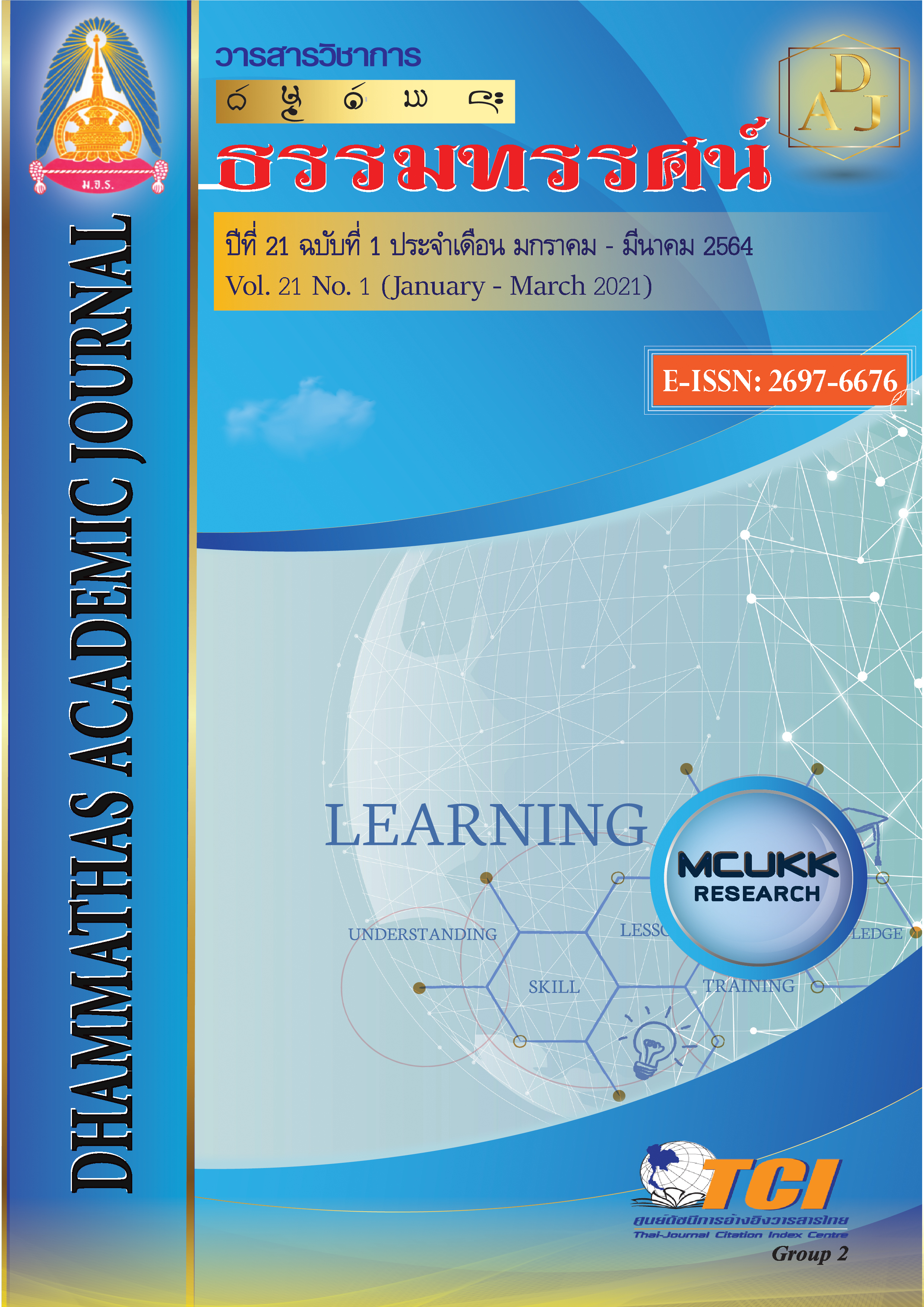The Emotion Resolution applying Buddhist Principles of Graduates Students
Main Article Content
Abstract
The objectives of the research were as follows: 1) to synthesis the emotion resolution in Theravada Buddhism, 2) to study emotion resolution of graduate students enrolled in Faculty of Buddhism and Philosophy, Mahamakut Buddhist University Isan Campus, and 3) to form emotion resolution guidelines of graduate students. The research was in Qualitative research carried out by studying documents as a primary source and interviewing 18 persons as a secondary source. The collected data were categorized, analyzed, and synthesized systematically and presented in descriptive form.
The results of the research were as follows:
1. There are both bad and good emotions. If we cannot overcome the bad-temper, it will cause problem: suffering.Declining from good deeds and accumulate suffering led the way to the death of the goodnessand people may be careless infatuation. Once person is able to eliminate bad-temper, good results will emerge: loved, respected, and admired by others. It can prevent bad deeds and create happiness.
2. The emotion resolution in Theravada Buddhism means to focus on life by avoiding, overcoming, detaching bad-temper, and following 4 principles of mindfulness.
3. The problems of graduate students; most of them did not study and practice dhamma, were selflessness, engaged in bad environment, not having good friends, and no discipline. The ways to solve were; be conscious, practice meditation, have good friends, and do good deeds.
Article Details
References
ฐิติรัตน์ รักษ์ใจตรง. (2549). ศึกษาการใช้อานาปานสติภาวนาเพื่อพัฒนาคุณภาพชีวิตของเสถียรธรรมสถาน. (วิทยานิพนธ์พุทธศาสตรมหาบัณฑิต). พระนครศรีอยุธยา: มหาวิทยาลัยมหาจุฬาลงกรณราชวิทยาลัย.
ประทีป พืชทองหลาง. (2555). รูปแบบการปรึกษาเชิงพุทธตามหลักกัลยาณมิตร. (วิทยานิพนธ์พุทธศาสตรดุษฎีบัณฑิต). เชียงใหม่: มหาวิทยาลัยมหาจุฬาลงกรณราชวิทยาลัย.
พระครูวีรญาณนุยุต (นิพนธ์ ญาณวีโร/โสดา). (2555). กิจกรรมส่งเสริมศีลธรรมนักเรียนโรงเรียนกู่สว่างสามัคคี อำเภอน้ำพอง จังหวัดขอนแก่น. (วิทยานิพนธ์พุทธศาสตรมหาบัณฑิต). ขอนแก่น: มหาวิทยาลัยมหาจุฬาลงกรณราชวิทยาลัย.
พระทรัพย์ชู มหาวีโร (บุญพิฬา). (2553). การศึกษาวิธีการเจริญสติในชีวิตประจำวันตามแนวทางของติช นัท ฮันห์. (วิทยานิพนธ์พุทธศาสตรมหาบัณฑิต). พระนครศรีอยุธยา: มหาวิทยาลัยมหาจุฬาลงกรณราชวิทยาลัย.
พระบำรุง ปญฺญาพโล (โพธิ์ศรี). (2554). ปัจจัยที่มีผลต่อการปลูกฝังคุณธรรม และจริยธรรมของนักศึกษาวิทยาลัยเทคโนโลยีสยาม เขตบางกอกใหญ่ กรุงเทพมหานคร. (วิทยานิพนธ์พุทธศาสตรมหาบัณฑิต). พระนครศรีอยุธยา: มหาวิทยาลัยมหาจุฬาลงกรณราชวิทยาลัย.
พระพรหมคุณาภรณ์ (ป.อ. ปยุตฺโต). (2557). พุทธธรรม ฉบับปรับปรุงและขยายความ. (พิมพ์ครั้งที่ 11). กรุงเทพฯ: มหาจุฬาลงกรณราชวิทยาลัย.
มหาวิทยาลัยมหาจุฬาลงกรณราชวิทยาลัย. (2539). พระไตรปิฎกภาษาไทย ฉบับมหาจุฬาลงกรณราชวิทยาลัย. กรุงเทพฯ: มหาจุฬาลงกรณราชวิทยาลัย.
แม่ชีสุดา โรจนอุทัย. (2553). ศึกษาวิเคราะห์ปัจจุบันขณะในพระพุทธศาสนาเถรวาท. (วิทยานิพนธ์พุทธศาสตรมหาบัณฑิต). พระนครศรีอยุธยา: มหาวิทยาลัยมหาจุฬาลงกรณราชวิทยาลัย.
สุธรรมมา วรนาวิน. (2551). ผลของการปฏิบัติสมาธิที่มีต่อความฉลาดทางอารมณ์: กรณีศึกษาผู้ปฏิบัติธรรม โครงการเฉลิมพระเกียรติตามรอยเบื้องพระยุคลบาทวัดโสมนัสวิหาร. (วิทยานิพนธ์พุทธศาสตรมหาบัณฑิต). พระนครศรีอยุธยา: มหาวิทยาลัยมหาจุฬาลงกรณราชวิทยาลัย.

